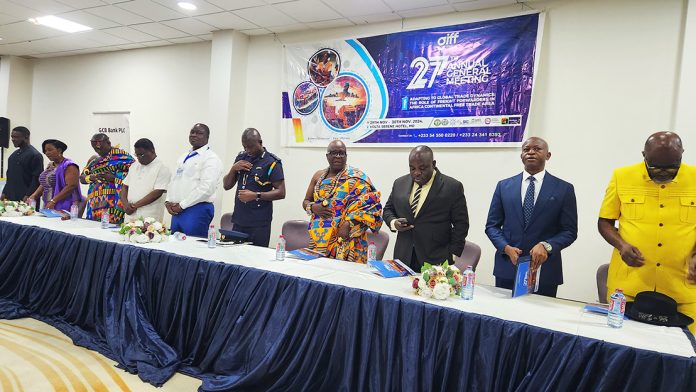The Ghana Institute of Freight Forwarders (GIFF) has held its 27th Annual General Meeting (AGM) in Ho, with key discussions centring on the evolving role of freight forwarders in the context of global trade dynamics, particularly in relation to the African Continental Free Trade Area (AfCFTA).
The Director-General of the Ghana Ports and Harbours Authority (GPHA), Mr Michael Luguje, urged freight forwarders to prioritise transparency by accurately declaring the contents of all imported cargo.
According to Mr Luguje, such practices will foster trust between freight forwarders and Customs officials, consequently making the clearance process smoother and faster.
“Once Customs trust you that whatever you say you have in there, even if they waste their time opening it, it’s the same; if they scan it, it’ll be the same.
Over time they will trust you and say maybe forty or fifty per cent of containers will be scanned, while the rest can move out because we believe everything is fine,” Mr Luguje said, emphasising the importance of building this trust for the smooth facilitation of trade.
He explained that failure to establish trust and cooperation would impede the effectiveness of initiatives like AfCFTA, which aims to increase intra-African trade.
“AfCFTA may open new markets, but goods won’t cross borders smoothly without the trust and cooperation needed to facilitate trade,” he noted.
Mr. Luguje also underscored the need for a strong partnership between freight forwarders and truck owners, stressing that only road worthy trucks should be allowed to transport cargo to and from the ports,” he said.
Addressing operational challenges, he cautioned that inefficiencies in cargo transportation could hinder the ability of producers to meet market demands, even with the benefits of AfCFTA.
“Without addressing these operational issues, even with the opportunities presented by AfCFTA, producers may struggle to meet demand due to inefficiencies in cargo transportation,” he warned.
He highlighted recent advancements in Ghana’s port infrastructure, including significant improvements at the Tema and Takoradi ports, with the latter now handling large vessels as the Tema Port.
Mr Luguje also mentioned the ongoing feasibility studies for a third port in Keta, expected to further enhance Ghana’s port capabilities.
The GPHA Director-General revealed plans to launch a commercial partnership campaign next year to support ongoing development projects at the ports.
He also discussed a major road improvement project funded by the Port Infrastructure Development Fund, which would help ease the flow of traffic to and from the Port of Tema.
“Together, we should look forward to a future of enhanced trade facilitation, economic prosperity, and continental integration,” he added.
Dr Emmanuel Kofi Mbiah, a private legal practitioner and Chairman of the Chamber of Shipping, called for stricter enforcement of Customs sanctions to deter traders who fail to fully declare their cargo. He noted that in countries like Singapore, stringent sanctions act as an effective deterrent.
“In Singapore, if ammunition is found in a container and it is discovered that it belongs to you, the sanction regime that is applied is a deterrent, and no one will dare do it again,” he averred.
He urged the industry to adopt benchmarking and best practices, emphasising that Ghana is not an island.
“It is only best practices that can carry the industry forward; otherwise, we will only be thinking about the negatives and consequently apply policies that do not give us positive outcomes,” he stated.
The President of GIFF, Mr Stephen Adjokatcher, urged members to stay informed about both local and international regulatory changes, as well as the emerging trends of the Fourth Industrial Revolution.
He emphasised that staying ahead of these developments was essential for guiding clients through complex trade dynamics and ensuring the success of the freight forwarding industry.
“Staying knowledgeable about these evolving dynamics is essential for ensuring compliance, helping clients navigate the trade landscape, and guaranteeing the continued success of our business,” Mr Adjokatcher noted.
There were solidarity messages from the Customs division of GRA, the Ghana Union of Traders Association, the Ghana Maritime Authority and the Ghana Shippers’ Authority, who underscored the important role of the freight forwarders in trade facilitation.









